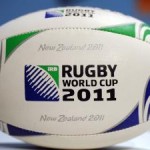5 – Days left until the first match of RWC 2011, and countries who have reached the quarter-finals of every World Cup:
Australia, England, France, New Zealand and Scotland.
He said it
“There was almost a few broken bones and a few bodies knocked out of the World Cup. I wasn’t great to be honest, I was just trying to knock people off the road.”
– Ireland wing Tommy Bowe gives coach Declan Kidney – not to mention the physios – a few grey hairs when he and his teammates tackled the Skyline Luge through the trees of Queenstown.
Mallett’s dream sequence
Italy coach Nick Mallett will hope fortune continues to smile on him during Rugby World Cup 2011. The South African is aiming to become the first coach to lead the Azzurri into the quarter-finals.
While Mallett is taxing his brain for a game plan to tackle Australia, Ireland, USA and Russia, he can at least reflect that he had one of the more comfortable journeys to New Zealand.
“I was very lucky,” Mallett said. “There were 41 of 42 first-class places filled, so I was bumped up from business class. I was very lucky and could sleep all the way from Bangkok to Sydney.”
No doubt he was dreaming of seeing off Ireland on 2 October – the final pool game – to take a quarter-final spot.
Just for laughs
Rugby folk love a good yarn and some of the best story-tellers in the game will be reeling off their best lines in Auckland next month.
Former internationals Eric Rush of New Zealand, Scotland’s Ian Robertson and Martin Bayfield of England, as well as Australian comedian Vince Sorrenti, will join up for the Rugby Comedy Festival on 22 October at the Aotea Centre. Book online at www.buytickets.co.nz.
Sight for sore eyes
Any designs that All Black Piri Weepu had on a refereeing career took a knock during the team’s visit to Kaeo Rugby Club, south of Auckland.
The New Zealand team have been visiting communities around the country and scrum half Weepu took the ref’s whistle for a match between two sides from Kaikohe West School. Afterwards he reflected: “It was terrible. That last group I had, one of the girls said I needed her father’s glasses.”
Weepu can take consolation from the fact he got off lightly compared with some officials in the round-ball code. Scotland’s football league referees are sponsored by a major spectacle chain.
Have boots, will travel
A feature of the increasingly global nature of rugby is the number of foreign coaches taking up the reins with national teams.
In the first Rugby World Cup in 1987, each of the 16 teams featured a home-grown trainer. This time eight of the 20 sides have a head coach originally associated with another country:
Canada (Kieran Crowley, New Zealand); Japan (John Kirwan, New Zealand); Georgia (Richie Dixon, Scotland); Scotland (Andy Robinson, England); Australia (Robbie Deans, New Zealand); Italy (Nick Mallett, South Africa); USA (Eddie O’Sullivan, Ireland); and Wales (Warren Gatland, New Zealand). The record for foreign coaches is nine in 2003.
Tonga’s coach Isitolo Maka, although he was born in the country, played for New Zealand.
French fans could be forgiven for suspecting an All Blacks conspiracy in Pool A: of the five teams (New Zealand, France, Japan, Canada and Tonga), Les Tricolores’ Marc Lièvremont is the only coach without a New Zealand history.
Super Cooper
Much has been made of Quade Cooper’s New Zealand heritage, with many All Blacks fans bemoaning his family’s decision to move across the Tasman in 2001.
But whatever inspired the decision to leave does not seem to have been shared by other residents of the North Island town of Tokoroa.
The 2006 census recorded the population of Tokoroa, located at the heart of New Zealand’s massive forestry, timber and paper industries, as 15,063, virtually unchanged from the 1996 figure of 15,096.
Other notable residents, past and present, include All Blacks Keven Mealamu, Richard Kahui and Walter Little, Ireland scrum half Isaac Boss, and Henry Paul, who played rugby league for New Zealand before representing England at union.
Baulk the walk
Scotland’s 205cm second row Richie Gray, one of the tallest players at RWC 2011 (Luke Charteris of Wales is 206cm), confounds the stereotype of lumbering forwards with his non-stop dynamism round the field.
Off it, Gray is a little more sedentary, revealing in a recent interview: “I don’t like to walk about when I don’t have to.”
In the second (row) flush of youth
Age is all relative, judging by a line from the England media guide, in which manager Martin Johnson describes his charges as “a young squad”.
While there are several fresh-faced players, the presence of stalwarts such as Simon Shaw (38) ups the average age of England’s squad to 28 years and 32 days, which puts them roughly mid-table for RWC maturity. There are 11 older squads (Ireland’s is the most senior at 29 years and 34 days), while Australia’s average age of 25 years and 363 days makes them the only squad with an average age under 26.
New Zealand’s forward-looking PM
Does New Zealand Prime Minister John Key know something we don’t? Mr Key was in Christchurch on Sunday to show his support on the anniversary of the first of the three earthquakes to hit the city and he will be back to watch the first knockout round at the city’s fan zone. “I’m going to go down there and watch the All Blacks play in the quarter-finals,” he said. Now, we know New Zealand might be favourites but there are still four pool games to get through …
